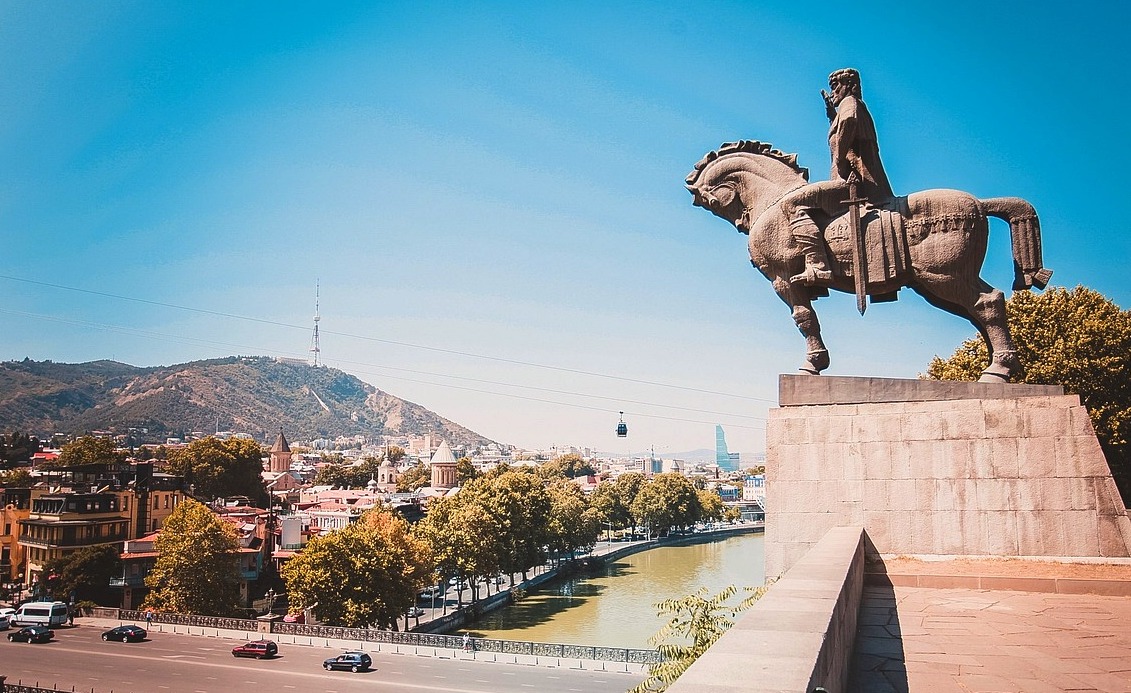This article is reserved for our members
Arriving at Tbilisi airport, you know immediately that you are in a special place. Georgia. The Caucasus. A female customs officer with fashionable glasses stamps my passport indifferently. A placid middle-aged Russian-speaking taxi driver drives me past crumbling Soviet-era buildings along a perfect highway framed by mountains and hills to Rustavi, half an hour from the capital. The emptiness and abandonment are palpable. We see the odd sheep grazing, and other signs of life, but the taxi driver says: “They all live in Tbilisi. There’s almost nothing left around here, nobody grows crops any more, there’s nothing left.”
The landlady of the guesthouse where I am staying, Marika, is a primary-school teacher who has been teaching since Soviet times. She is adored by the schoolchildren and has lived here all her life. Her husband, Avtandil, works at the famous Rustavi metalworks in eastern Georgia, which was one of the largest in the USSR. Avtandil is 74 years old and wakes up every morning at six to go to the plant.
He is the brains of the pipes, as his colleagues put it: without him the metalworks would go to ruin because there is no generational continuity. The same thing happens in Russia and other post-Soviet countries with this type of industry. Salaries are low, even derisory, so no one wants to spend time learning such pearls of industrial wisdom.
Marika and Avtandil come to visit us regularly. They bring chacha (a type of brandy made from grape marc or fruit), which I have never tried, along with other excellent liqueurs – and cakes, which Marika bakes. Besides singing, playing the piano and knowing Georgian and Russian poetry by heart, Marika is also an excellent cook.
Receive the best of European journalism straight to your inbox every Thursday
With me are Igor from Moscow, Nastja from Mariupol, and Yumi and Yuda from Osaka, a pleasant Japanese couple who arrived before us and decided to extend their stay until the end of April. Marika adores them: they are polite and modest people, always smiling and helping with the cleaning. In truth Marika dotes on us all, and while we are here we become part of her family, alongside the two children and grandchildren she already has.
A time machine
Rustavi has two souls: a new one and an old one. We live in the new one, the one that is teeming with life today. The old town was built by prisoners after the war. This was told to me by a talkative fellow passenger on the bus, who spoke Russian even with Georgians. “It was not only Germans who built it, but of course there were many of them here… I used to teach in the best kindergarten, but after the collapse of the USSR it was a disaster, children were fainting from hunger. There was no electricity, the water supply was patchy, even the food was bad. What hard times!”
The traces of the decadence of that time are still visible. Ghost houses with sealed windows, and so many abandoned Soviet buildings that one loses count. The contrast with the new ones is striking, it is like travelling from one era to another in a time machine. “We have a new mayor, a woman, she is energetic. Do you see how the city has improved with her?”, says my travelling companion proudly.
If the new Rustavi resembles the modern suburbs of Moscow, the old one is more like a Stalinist Georgian city: solemn, geometric, austere. It stretches along the banks of the Kura and brings to mind the capital Tbilisi, which lies downstream on the same river.
Walking down the avenue and then across the bridge over the Kura – dotted with fishermen hanging out w…
